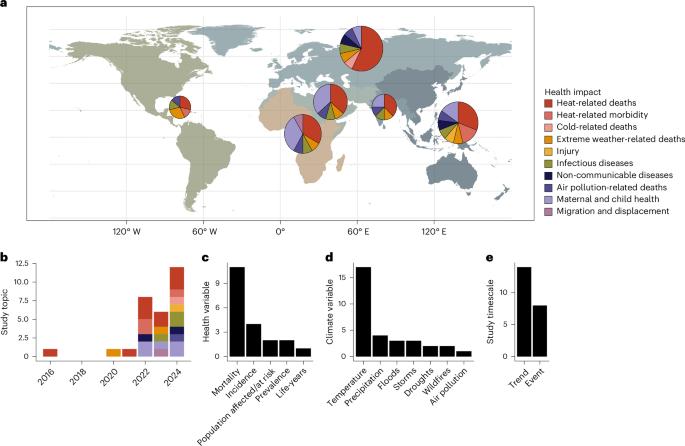Health losses attributed to anthropogenic climate change
IF 27.1
1区 地球科学
Q1 ENVIRONMENTAL SCIENCES
引用次数: 0
Abstract
Over the last decade, attribution science has shown that climate change is responsible for substantial death, disability and illness. However, health impact attribution studies have focused disproportionately on populations in high-income countries, and have mostly quantified the health outcomes of heat and extreme weather. A clearer picture of the global burden of climate change could encourage policymakers to treat the climate crisis like a public health emergency. The authors assess the growing field of climate change health impact attribution. They show literature bias towards direct heat effects and extreme weather in high-income countries, highlighting the lack of global representation in current efforts.

人为气候变化造成的健康损失
在过去的十年里,归因科学表明,气候变化是造成大量死亡、残疾和疾病的原因。然而,健康影响归因研究不成比例地侧重于高收入国家的人口,并且大多量化了高温和极端天气对健康的影响。更清晰地了解气候变化的全球负担,可能会鼓励政策制定者将气候危机视为突发公共卫生事件。作者评估了气候变化对健康影响归因这一日益增长的领域。他们表明,文献偏向于高收入国家的直接热效应和极端天气,突出了目前的努力缺乏全球代表性。
本文章由计算机程序翻译,如有差异,请以英文原文为准。
求助全文
约1分钟内获得全文
求助全文
来源期刊

Nature Climate Change
ENVIRONMENTAL SCIENCES-METEOROLOGY & ATMOSPHERIC SCIENCES
CiteScore
40.30
自引率
1.60%
发文量
267
审稿时长
4-8 weeks
期刊介绍:
Nature Climate Change is dedicated to addressing the scientific challenge of understanding Earth's changing climate and its societal implications. As a monthly journal, it publishes significant and cutting-edge research on the nature, causes, and impacts of global climate change, as well as its implications for the economy, policy, and the world at large.
The journal publishes original research spanning the natural and social sciences, synthesizing interdisciplinary research to provide a comprehensive understanding of climate change. It upholds the high standards set by all Nature-branded journals, ensuring top-tier original research through a fair and rigorous review process, broad readership access, high standards of copy editing and production, rapid publication, and independence from academic societies and other vested interests.
Nature Climate Change serves as a platform for discussion among experts, publishing opinion, analysis, and review articles. It also features Research Highlights to highlight important developments in the field and original reporting from renowned science journalists in the form of feature articles.
Topics covered in the journal include adaptation, atmospheric science, ecology, economics, energy, impacts and vulnerability, mitigation, oceanography, policy, sociology, and sustainability, among others.
 求助内容:
求助内容: 应助结果提醒方式:
应助结果提醒方式:


